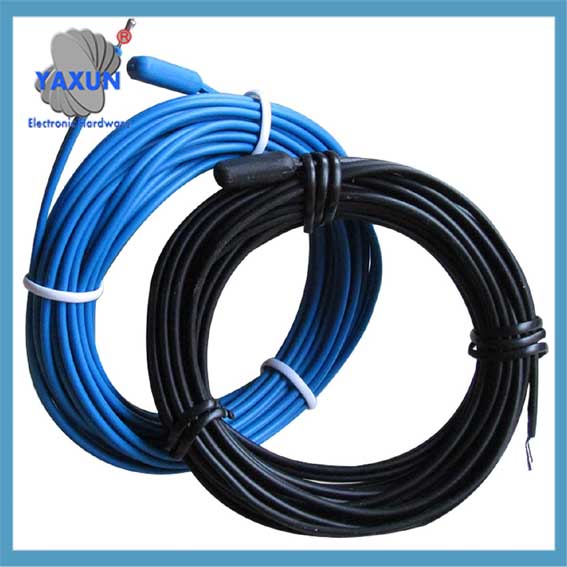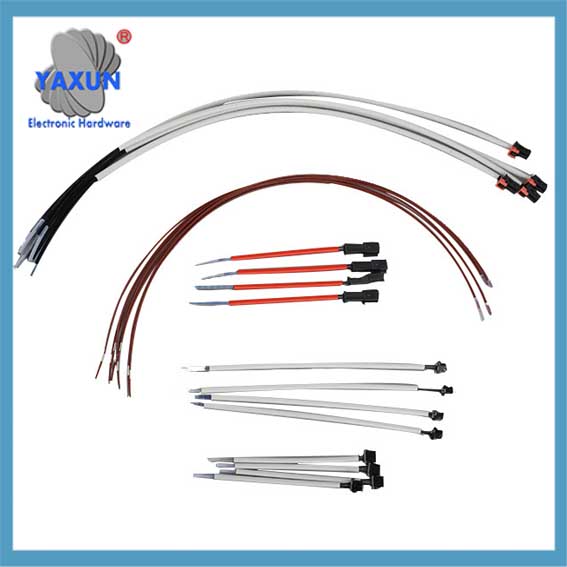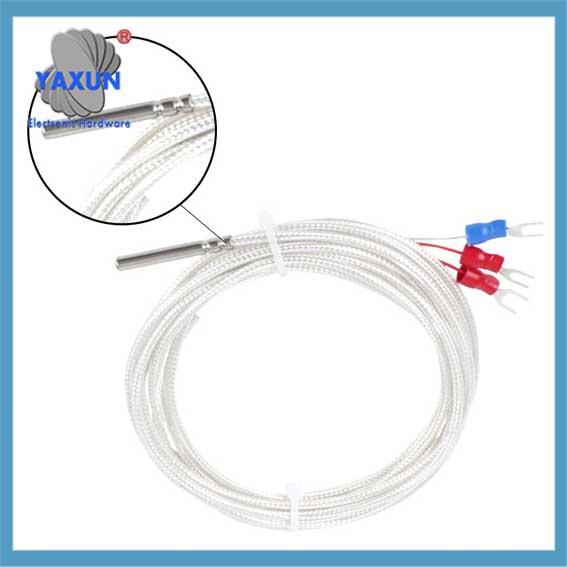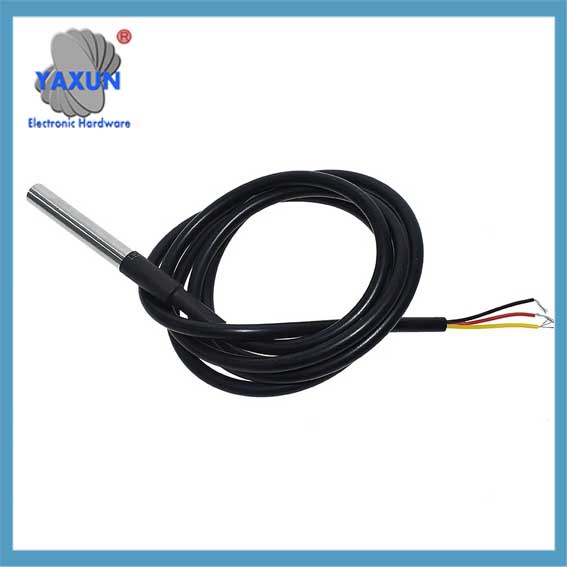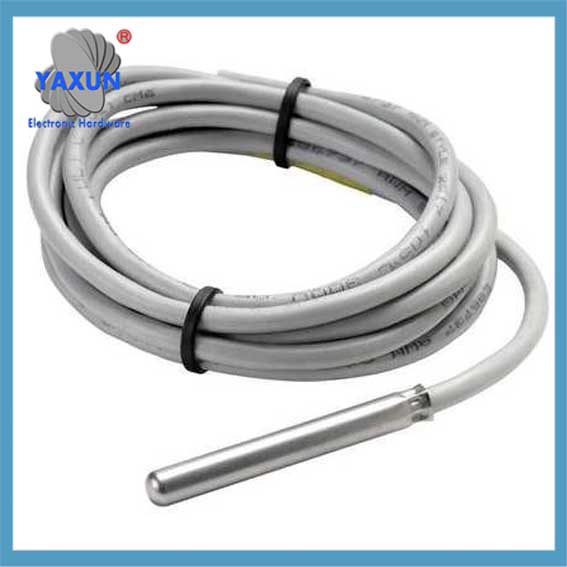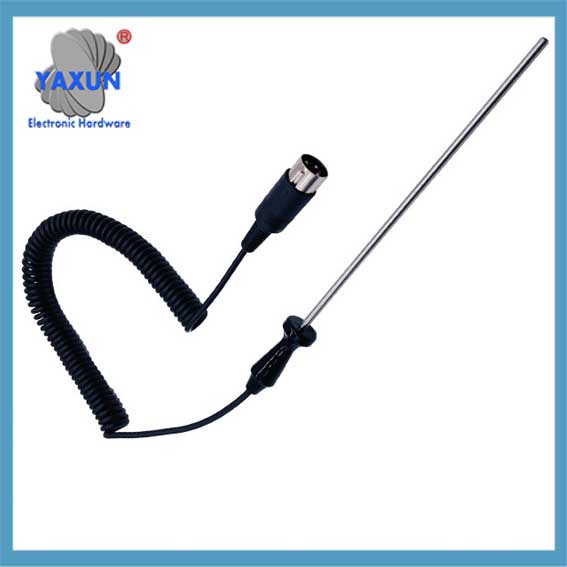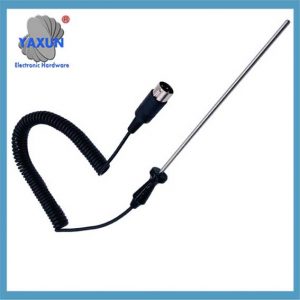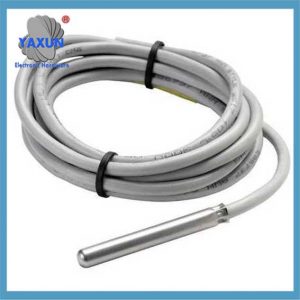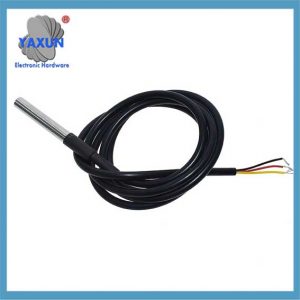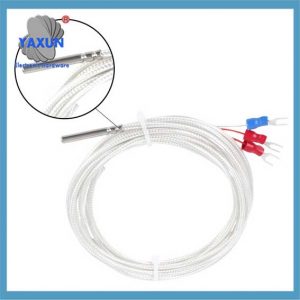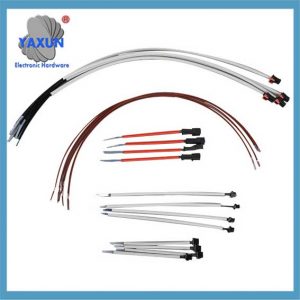ürün kategorileri
- termal sigorta 32
- yüzeye monte sigortalar 12
- termistör 36
- PCB Montajlı Sigorta Tutucu 27
- Kablo demeti 6
- Bıçak Sigorta Tutucuları 17
- termostat 50
- Elektrik sigortası 24
- Otomotiv sıcaklık sensörü 7
- Termal Devre Kesici 22
- Sigorta kutusu tutucusu 36
- Sıcaklık sensörü 75
- Isı anahtarı 68
- Araba Sigortası 20
- Cıvatalı Sigortalar 8
Ürün Etiketleri
NTC, PTC, PT100, Sıcaklık Probu Sensörleri için DS18B20
Termokupl probu: Sıcaklığı ölçmek için termoelektrik etkiyi kullanır, Geniş bir ölçüm aralığı ve hızlı tepki hızı özelliklerine sahiptir..
Termal direnç probu: Sıcaklığı ölçmek için metal veya yarı iletken malzemelerin direncinin sıcaklıkla değişmesi özelliğini kullanır, ve yüksek ölçüm doğruluğu ve iyi stabilite özelliklerine sahiptir.
Yarı iletken prob: sıcaklığı ölçmek için yarı iletken malzemelerin iletkenliğinin sıcaklıkla değişmesi özelliğini kullanır, ve küçük boyut özelliklerine sahiptir, hafif ve düşük güç tüketimi.
NTC, PTC, PT100, DS18B20 Sıcaklık probları ve sıcaklık sensörleri, sıcaklık ölçümü alanında önemli bir rol oynar. Aşağıda sıcaklık prob sensörlerine ayrıntılı bir giriş:
Birçok sıcaklık sensörü türü var, içermek:
Termokupllar
Bu sensörler, bir kavşak oluşturmak için iki noktada bağlanan iki farklı metalden yapılmıştır.. Güvenilirler, kesin, ve çok çeşitli sıcaklıklarda çalışabilir.
Direnç sıcaklık dedektörleri (RTD'ler)
Bu sensörler, sıcaklık değiştikçe bir metalin direncindeki değişime dayanmaktadır..
Termistörler
Bu sensörler yarı iletken dirençlerin sıcaklık özelliklerini kullanır, sıcaklık değiştikçe direnci değiştiren. Termistörler hassastır ve maliyetlerine göre yüksek doğruluğa sahiptir.
Negatif sıcaklık katsayısı (NTC) termistörler
Bu sensörler hassastır ve çok küçük sıcaklık değişikliklerine yanıt verebilir. Sıcaklık aralığına sahipler -50 ° C ila 250 °C.
Direnç sıcaklık dedektörleri
Bu sensörler pozitif sıcaklık katsayılarına sahiptir (PTC) ve kesin sıcaklık ölçümleri sunar. Fakat, Hassasiyeti zayıf.
1. Tanım ve çalışma prensibi
Sıcaklık probu:
Tanım: Sıcaklık probu, sıcaklığı ölçmek için özel olarak kullanılan bir cihazdır, ve temel bileşeni sıcaklığa duyarlı bir elemandır.
Çalışma prensibi: Bir sıcaklık probu hassas öğeleri kullanır (termokupllar gibi, termal dirençler, yarı iletken, vesaire.) Sıcaklık değişikliklerini sonraki devre işleme veya ekran için elektrik sinyallerine dönüştürmek için.
Sıcaklık sensörü:
Tanım: Sıcaklık sensörü, bir sıcaklık probu ve kendisine bağlı bir sinyal işleme devresi içeren daha geniş bir kavramdır..
Çalışma prensibi: Bir sıcaklık sensörü sadece hassas bir eleman içermez, aynı zamanda edinimi tamamlayabilecek bir sinyal işleme devresi de var, Sıcaklık sinyallerinin işlenmesi ve çıkışı, genellikle dijital veya analog sinyaller şeklinde.
2. Türler ve özellikler
Sıcaklık prob tipi:
Termokupl probu: Sıcaklığı ölçmek için termoelektrik etkiyi kullanır, Geniş bir ölçüm aralığı ve hızlı tepki hızı özelliklerine sahiptir..
Termal direnç probu: Sıcaklığı ölçmek için metal veya yarı iletken malzemelerin direncinin sıcaklıkla değişmesi özelliğini kullanır, ve yüksek ölçüm doğruluğu ve iyi stabilite özelliklerine sahiptir.
Yarı iletken prob: sıcaklığı ölçmek için yarı iletken malzemelerin iletkenliğinin sıcaklıkla değişmesi özelliğini kullanır, ve küçük boyut özelliklerine sahiptir, hafif ve düşük güç tüketimi.
Sıcaklık sensörü tipi:
Analog sıcaklık sensörü: Çıkışlar Analog Sinyaller, sonraki işlem için analog-dijital dönüştürücüler tarafından dijital sinyallere dönüştürülmesi gereken.
Dijital Sıcaklık Sensörü: Doğrudan dijital sinyalleri çıkarır, Güçlü müdahale önleme yeteneğine sahiptir, yüksek doğruluk, ve kontrol sistemine entegre edilmesi kolaydır.
Akıllı Sıcaklık Sensörü: Kendi tanısı var, kendi kendine kalibrasyon, İletişim ve diğer işlevler, ve uzaktan izleme ve kontrolü gerçekleştirebilir.
3. Seçim ve Uygulama
Seçim Faktörleri:
Uygulama ortamı: Ölçülen ortamın aşınabilirlik gibi özel koşulları olup olmadığını düşünün, yüksek sıcaklık, yüksek baskı, vesaire., uygun malzemeleri ve koruma seviyelerini seçmek için.
Ölçüm aralığı: Sensörün gerekli aralık içinde doğru bir şekilde ölçülebilmesini sağlamak için ölçülecek sıcaklık aralığına göre uygun bir sensör seçin.
Doğruluk Gereksinimleri: Sıcaklık ölçümü başvurusunun doğruluk gereksinimlerine göre, Karşılık gelen doğruluğu olan bir sensör seçin.
Maliyet bütçesi: Performansı sağlama öncülünde, Maliyet faktörlerini göz önünde bulundurun ve maliyet etkin sensörleri seçin.
Uygulama alanları:
Endüstriyel otomasyon: Endüstriyel ekipmanlardaki sıcaklık değişikliklerini izlemek için kullanılır, Ekipman ve ürün kalitesinin normal çalışmasını sağlamak için makineler ve üretim süreçleri.
Tıp endüstrisi: tıbbi ekipmanlarda kullanılır, Hasta sıcaklığını izlemek için sıcaklık izleme aletleri ve ilaç depolama ekipmanı, Ortam sıcaklığı ve ilaç depolama koşulları.
Otomotiv endüstrisi: Elektrikli araç motorlarında kullanılır, kapasitörler, DC Dönüştürücüler, şarj sistemleri, ve otomobil motorları, dişli kutuları, Çeşitli sıvıların ve gazların sıcaklığını izlemek ve kontrol etmek için klima sistemleri ve egzoz sistemleri.
Tarım ve gıda işleme endüstrisi: tarımsal seralarda kullanılır, soğuk depolama, tarımsal ürünlerin ve gıdaların sıcaklığını izlemek ve kontrol etmek için gıda işleme ekipmanı ve taşıma araçları.
Diğer Alanlar: klima ve soğutma endüstrisi gibi, askeri ve havacılık endüstrisi, Nesnelerin İnterneti Endüstrisi, vesaire. ayrıca yaygın olarak kullanılır.
IV. Kullanım ve bakım
kurulum: Sensörü, sensör ve ölçülecek nesne arasında iyi bir temas sağlamak için kurulum talimatlarına göre doğru şekilde yükleyin ve uygunsuz kurulumun neden olduğu ölçüm hatalarından kaçının.
Wiring: Sinyal iletiminin stabilitesini ve doğruluğunu sağlamak için sensörün sinyal hattını ve güç hattını doğru bir şekilde bağlayın.
Katilasyon: Ölçüm doğruluğunun uygulama gereksinimlerini karşıladığından emin olmak için sensörü düzenli olarak kalibre edin. Kalibrasyon işlemi genellikle sensörü bilinen bir sıcaklık ortamına yerleştirmeyi içerir, Çıktı değeri ile standart değer arasındaki farkı karşılaştırma, ve gerekli ayarlamaları yapmak.
Bakım: Tozdan kaçınmak için sensörü düzenli olarak temizleyin ve bakımını yapın, kir, vesaire. sensörün ölçüm performansını etkiler. Aynı zamanda, Kablo bağlantısının gevşek olup olmadığını kontrol etmek için dikkat edin, ve hasarlı parçaları zamanında değiştirin.
Özetle, Sıcaklık prob sensörleri, sıcaklık ölçümü alanında geniş bir uygulamaya ve önemli bir konuma sahiptir.. Onları seçerken ve kullanırken, Ölçüm sonuçlarının doğruluğunu ve güvenilirliğini sağlamak için belirli uygulama senaryolarına ve gereksinimlerine dayalı kapsamlı düşünceler yapmak gerekir.. Başka sorularınız varsa veya daha fazla yardıma ihtiyacınız varsa, Lütfen bana bildirmekten çekinmeyin.
Bize Ulaşın
E-postanızı bekliyorum, size içinde cevap vereceğiz 12 ihtiyaç duyduğunuz değerli bilgilerle saatler.
 English
English Afrikaans
Afrikaans العربية
العربية বাংলা
বাংলা bosanski jezik
bosanski jezik Български
Български Català
Català 粤语
粤语 中文(简体)
中文(简体) 中文(漢字)
中文(漢字) Hrvatski
Hrvatski Čeština
Čeština Nederlands
Nederlands Eesti keel
Eesti keel Suomi
Suomi Français
Français Deutsch
Deutsch Ελληνικά
Ελληνικά हिन्दी; हिंदी
हिन्दी; हिंदी Magyar
Magyar Bahasa Indonesia
Bahasa Indonesia Italiano
Italiano 日本語
日本語 한국어
한국어 Latviešu valoda
Latviešu valoda Lietuvių kalba
Lietuvių kalba македонски јазик
македонски јазик Bahasa Melayu
Bahasa Melayu Norsk
Norsk پارسی
پارسی Polski
Polski Português
Português Română
Română Русский
Русский Cрпски језик
Cрпски језик Slovenčina
Slovenčina Slovenščina
Slovenščina Español
Español Svenska
Svenska ภาษาไทย
ภาษาไทย Türkçe
Türkçe Українська
Українська اردو
اردو Tiếng Việt
Tiếng Việt
